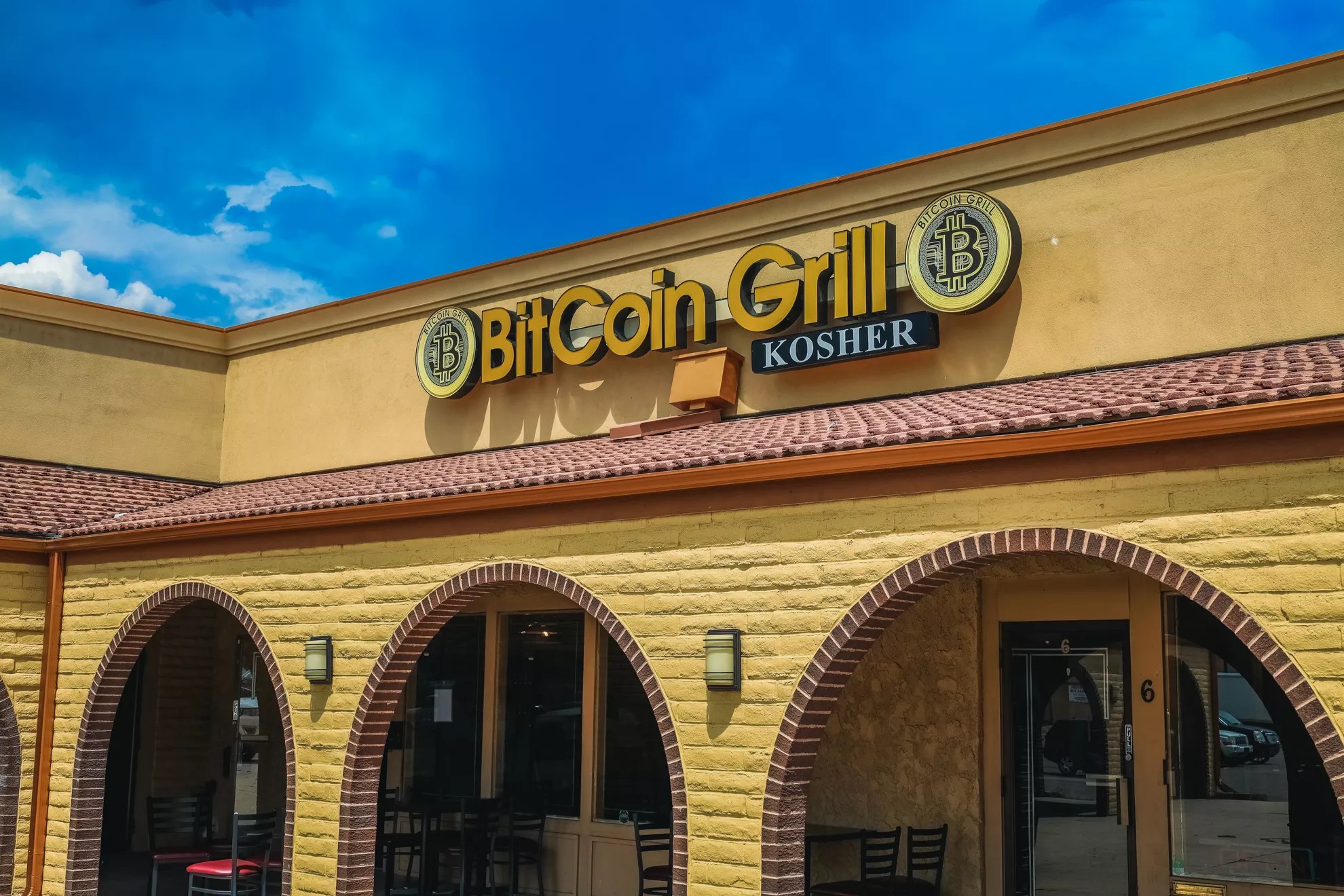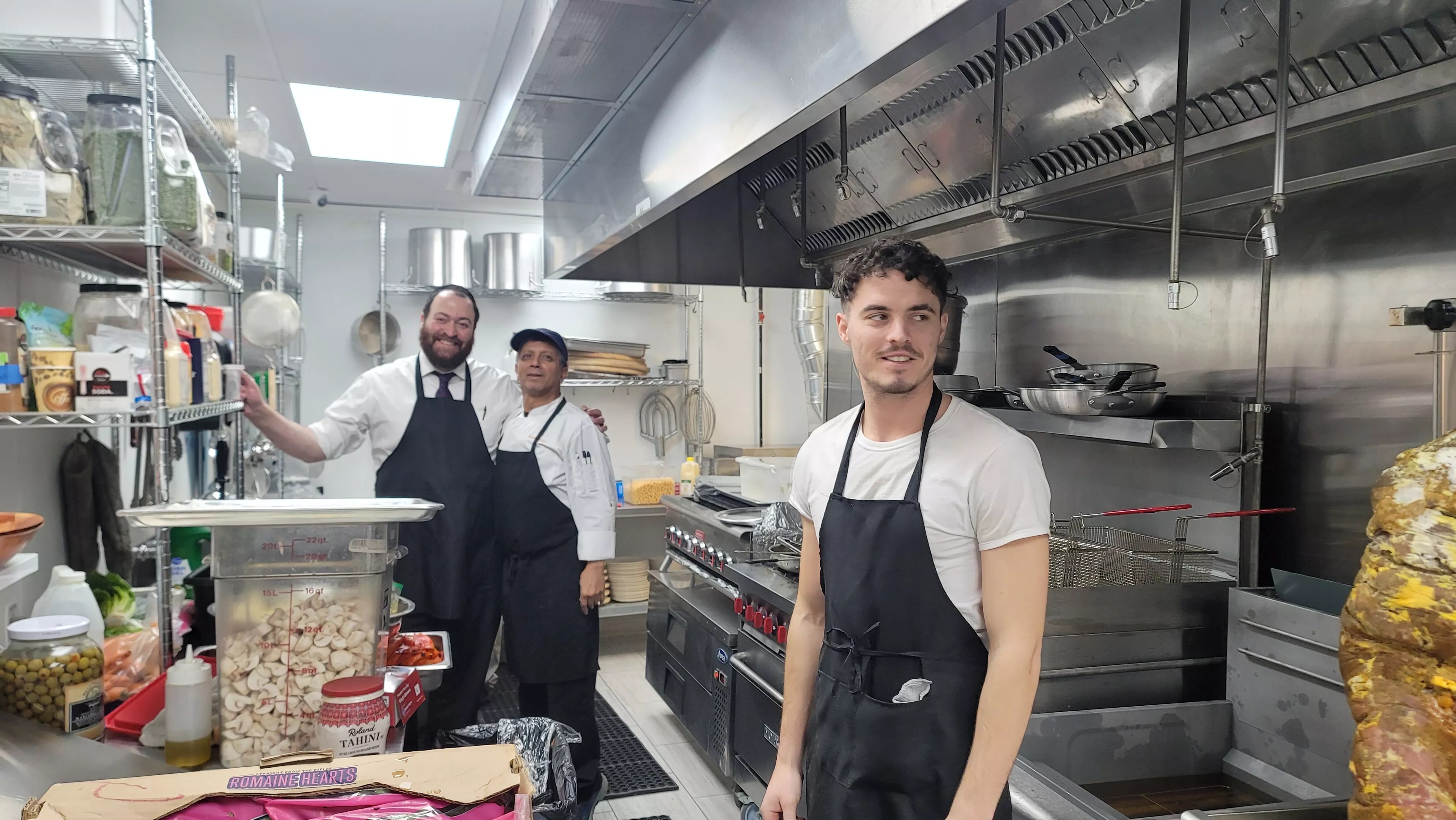
Bitcoin Grill

Audio By Carbonatix
Kosher food and cryptocurrency is an unlikely combination, but that’s exactly what to expect at Bitcoin Grill, a new restaurant that opened at 970 South Oneida Street on January 1. A sign on the front of the restaurant is emblazoned with the name, which is flanked by large black-and-gold bitcoin images, and a Letter of Kosher Certification is taped to the front window.
Owners Menachem (Menni) Elisha and Netanel (Nati) Sharafi are close friends as well as business partners. Both grew up in Israel, where their families struggled financially, and both immigrated to the United States to find better job opportunities and make more money on the advice of their rabbis. “I come from a very poor family,” Sharafi notes. “My age was 28, and without money, I could not get married, so I thought, ‘Okay! Let’s go to America.’ I came here [in 2017] with only $300, and I thought, if Nebraska doesn’t work out, there’s 49 other states for me to try.”
It was at a meatpacking plant in Nebraska where Sharafi met Elisha, who was working as a shochet, the person responsible for blessing, slaughtering and inspecting meat to ensure it meets kosher standards; Sharafi was his supervisor. The two quickly, along with some other workers, formed a close friendship, hanging out in their free time and having each other over to their homes on Saturday evenings to enjoy kosher meals together.
Even then, Sharafi dreamed of opening a restaurant. A devoted fan of the television show MasterChef, he loved how the dinner table could be a common space for people of all classes, races and religions to gather together.

A Letter of Kosher Certification is taped to the window at Bitcoin Grill.
Helen Xu
For years, the friends worked at the meatpacking plant on weekdays, saving all the money they could and visiting cities within driving distance on the weekends to visit synagogues and connect and pray with the local Jewish communities. That’s how they ended up spending time in Denver, where they found a large population of Ashkenazi Jews, but little to no kosher dining options. “[Jews living in Denver], they have to fly to Miami, to California, to New York,” explains Elisha. “The community here doesn’t have options, because they are Jewish and only eat kosher food. Let’s say they want to go on a date. There’s no viable option for a nice restaurant.”
Denver was the promised land for their future restaurant. Then in 2020, Elisha and Sharafi’s entire friend group got hooked on the cryptocurrency hype. They started devouring all the information they could online, watching YouTube videos and paying for private courses with so-called crypto gurus. The friends became convinced that there was a hot (and soon-to-end) bull market run, so they invested their life savings into crypto.
Elisha estimates that each friend invested around $60,000, putting money into everything from bitcoin to ethereum to various NFTs. In the end, they timed the market correctly and cashed out, making an estimated $250,000 each. For Elisha and Sharafi, it was time to build their dream.
As first-time restaurant and business owners, the two reached out to the Jewish community for help, posting in local Israeli Jewish Facebook groups asking for advice, connections, and even for a chef. Through that effort, they found David Melker, who has forty years of culinary experience. Melker designed a menu built on Middle Eastern classics including three types of hummus (classic, mushroom and meat lovers), shawarma, schnitzel, falafel and kebabs. “Everything is fresh. We make the falafel, we make it here. We make the pita. We make everything here – the sauce, everything,” Elisha says proudly.
They’ve also deliberately kept the prices of some items, like the falafel, low in order to make the food accessible to those who struggle to afford the often higher cost of kosher foods.

Employees have been prepping for Bitcoin Grill’s debut.
Helen Xu
Opening one of Denver’s only kosher restaurants has come with its own set of challenges. The duo had to purchase all of the kitchen equipment brand-new to ensure that the food would never touch the surfaces of equipment or machinery used for non-kosher foods. They also needed to hire local food rabbis from the Scroll K, a nonprofit kashrus agency that deals in kosher certification.
While interviewing Elisha and Sharafi at the restaurant, two rabbis from the agency were on hand, ensuring that all the ingredients are kosher-compliant, that all kosher dietary laws are being followed in the preparation of the food, and that all the vegetables are being washed to ensure that there are no insects. To stay kosher-compliant, Bitcoin Grill will pay the agency between $4,000 and $5,000 per month to staff the restaurant with food rabbis when the restaurant is serving customers.
All in all, Elisha and Sharafi estimate that opening the restaurant has cost them around $450,000 – basically their entire crypto investment profits. But the two are grateful for the opportunity, and chose to name the restaurant Bitcoin Grill as a tribute to the coin that provided them the capital to build their dream.
It will also accept bitcoin as payment using the Muun application, a sort of Venmo for bitcoin that allows a customer to send crypto via a QR code. This means that customers will need to have a Muun wallet set up before the transaction, a process that takes quite a bit of technical literacy.
The owners are adamant that they will not convert the bitcoin to cash, but instead hold on to it as an investment for the future. Elisha and Sharafi don’t believe that many people will utilize the option. “I think only 1 percent will pay with bitcoin,” Sharafi admits.
Elisha disagrees, though. “In Colorado, there’s a big crypto community, and so we don’t know yet,” he says. “A lot of people have told us they plan to pay with bitcoin.” Regardless of how many people utilize the option, the two want the local crypto community to know that it’s welcome; future plans also include hosting crypto events and inviting popular YouTube crypto personalities to the restaurant.
Sharafi hopes that this will be the first of many Bitcoin Grills. He dreams of seeing the brand all over the United States, marrying kosher and bitcoin for a techno-delicious experience. But for now, he and Elisha are focused on their first location.
“We like to see people from all cultures, from all religions to come here,” Elisha concludes. “We like the mix. Even though it’s special food for Jewish people, we more than welcome people from all cultures – Muslims, whites, everyone.”